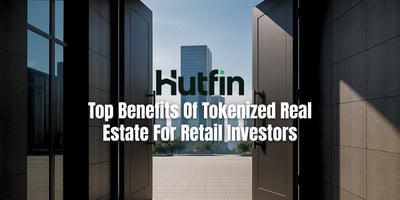You're Being Locked Out of the Best Deals. Here's the Key. For 100 years, the best real estate...
Proof of Ownership: What Separates Real Investors from Gamblers

Ownership isn’t a gesture; it’s a legal reality.
Let me tell you something that's going to save you from a world of pain.
When you invest your money, you need to own something. Not kind of own it. Not sort of have a claim to it. Actually own it.
And you need to be able to prove it.
Sounds obvious, right? You'd be shocked how many people hand over their money and have no actual legal proof of what they own.
I'm going to break down why proof of ownership is the most important thing nobody talks about, and how it protects you from getting completely screwed.
What Proof of Ownership Actually Means
Here's the deal.
Proof of ownership is your legal documentation that shows you have rights to an asset. It's not a handshake. It's not a promise. It's not an email saying "yeah, you're good."
It's a legal document that holds up in court.
In traditional investments, this looks different depending on what you're buying. Stocks? You get certificates or digital records through your brokerage. Real estate? You get a deed recorded with the county. Bonds? You get certificates or book entry records.
But here's where it gets messy in alternative investments like commercial real estate crowdfunding, private equity, or syndications.
A lot of platforms out there are playing fast and loose with this concept. They take your money. They tell you you're "invested." But what do you actually own? Can you prove it? Can you transfer it? Can you verify it independently?
These are the questions that separate legitimate investments from potential disasters.
Why This Matters More Than You Think
Let me paint you a picture.
You invest $50,000 into a commercial real estate deal through some platform. They send you a nice welcome email. Maybe a fancy PDF. You can log into their website and see your "investment dashboard."
Everything looks great.
Then something goes wrong. Maybe the platform goes bankrupt. Maybe there's fraud. Maybe there's a dispute about returns. Maybe you just want to sell your stake.
Now what?
If you don't have proper proof of ownership, you have nothing. You can't prove you own anything. You can't enforce your rights. You're just another person claiming they're owed money with no legal standing.
I've seen this happen. People lose everything because they assumed the platform's word was good enough. It's not.
The Red Flags You Need to Watch For
Here's what bad proof of ownership looks like.
Red flag one: The platform tells you you're investing, but you never receive any legal documentation showing what entity you own, what percentage you own, or what your rights are.
Red flag two: The "proof" is just access to a dashboard on their website. That's not proof. That's their database. If they change it, you have no recourse.
Red flag three: You can't independently verify your ownership. If the only record is on their servers and you can't cross reference it with actual legal entities or registries, that's a problem.
Red flag four: The documentation is vague about what you actually own. "Units" or "shares" that aren't clearly tied to a specific legal entity with specific rights.
Red flag five: There's no clear chain of custody. You should be able to trace your investment from your bank account to the specific asset or entity you now own a piece of.
What Good Proof of Ownership Looks Like
Okay, so what should you actually be looking for?
Good proof of ownership is specific. It names you. It names the exact entity or asset. It specifies your ownership percentage or number of shares. It includes the date. It's signed by authorized parties.
Good proof of ownership is registered. For real estate, that means recorded with the county. For securities, that means registered with the appropriate authorities. For LLCs, that means filed with the state.
Good proof of ownership is verifiable. You can independently confirm it exists outside of just the platform's word.
Good proof of ownership includes your rights. What can you do with this ownership? Can you sell it? Do you get voting rights? What are you entitled to? This should be crystal clear.
Good proof of ownership is backed by legal entities. You're not just "investing in a deal." You're buying membership units in a specific LLC that owns a specific property at a specific address. Details matter.
How Hutfin Gets This Right

Because real investors hold documents, not hopes.
This is another area where Hutfin stands out from the crowd, and why serious investors trust them.
When you invest through Hutfin, you get actual proof of ownership. Not a screenshot. Not just dashboard access. Real documentation.
You receive legal documentation showing your ownership in the specific SPV (Special Purpose Vehicle) or entity that owns the commercial property. This is a real legal entity, registered with the state, that you can verify independently.
You get clear documentation of your ownership percentage, your rights, and what you're entitled to. Everything is spelled out in legal language that actually means something.
And here's the critical part. This ownership is verifiable outside of Hutfin's platform. The entities are real. The registrations are real. Your ownership is real.
If something happened to Hutfin tomorrow (which is not likely, but stay with me), your ownership in those underlying entities would still exist. You'd still own what you own. That's what real proof of ownership means.
Compare that to platforms where you're just a line item in their database with no independent legal standing. It's night and day.
What You Should Do Right Now
If you're already invested in commercial real estate or any alternative investment, here's your homework.
Go find your proof of ownership documents. Actually locate them. Read them.
Can you identify exactly what entity you own? Can you verify that entity exists? Do you understand your rights? Could you prove your ownership to a lawyer or in court if you needed to?
If the answer to any of those questions is no, you have a problem. And you need to fix it before something goes wrong.
If you're looking at new investments, make proof of ownership one of your non negotiables. Before you commit any money, ask these questions:
What exactly will I own? What documentation will I receive proving my ownership? How can I verify this ownership independently? What are my rights as an owner? How is my ownership registered and with whom?
If the platform can't give you clear answers, walk away. There are plenty of legitimate opportunities that do this right.
The Bottom Line
Proof of ownership isn't sexy. It's not exciting. Nobody brags about their documentation at dinner parties.
But it's the foundation of everything.
Without it, you're not an investor. You're just someone who gave money to someone else and hopes they'll be honest about it.
Real investors own real things with real documentation. Everything else is just gambling with extra steps.
Don't skip this part. Don't assume it's handled. Don't trust that everyone has your best interests at heart.
Verify your ownership. Get the documentation. Understand what you actually own.
Because when things go sideways, and sometimes they do, that piece of paper is the only thing standing between you and losing everything.
Protect yourself. Demand proof. Own real things.
Your financial future depends on it.



-1.png?height=200&name=hubspot1%20(1)-1.png)
